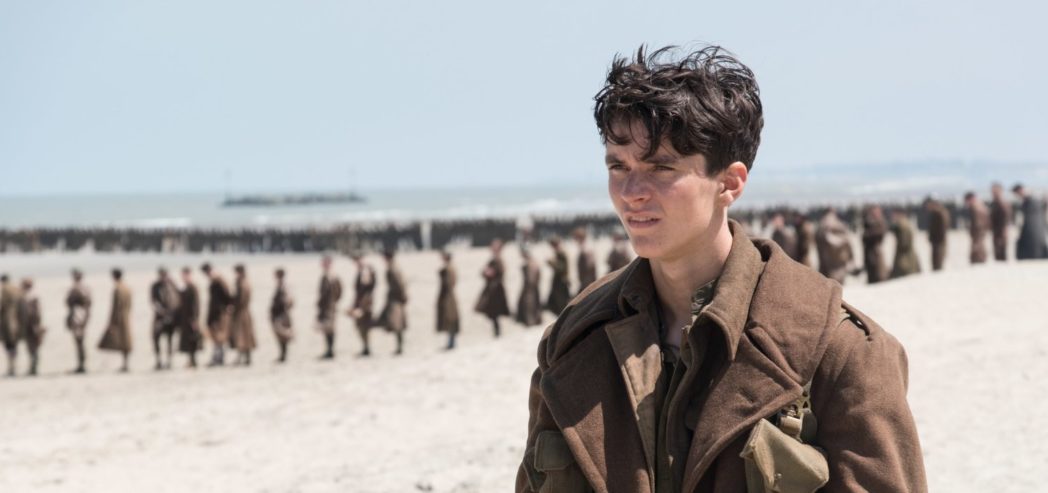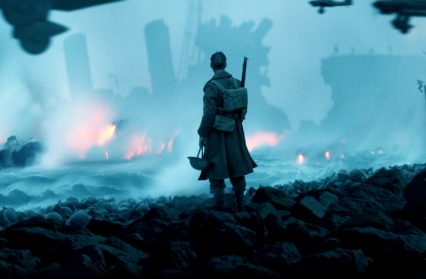Siobhan Denton reviews Christopher Nolan’s Dunkirk, which veers neither into nationalism nor fatalism. Instead, the three narratives cast World War II into a new unexpected light.
Christopher Nolan’s preoccupation with the passing of time has been well-documented. His past films have all featured, to varying degrees, a focus on the impact of time, or time constraints. Be that the continual return to a specific time, as seen in Memento, or the dangers of time in Inception, in which the lengthened time period during a dream affords a disconnect from reality. Dunkirk, his latest effort, is no different, and while it is arguably his most conventional feature to date, its use of three interlinking timelines not only aids dramatic tension, but enhances narrative development.
Too often, the tendency with war films has been to allow the accounts to fall into two diametrically opposed versions: the heroic brothers-in-arms who sacrifice everything for the good of patriotic pride; or a Malickian philosophical perspective, in which humanity’s efforts are viewed as ultimately futile and fatalistic. Nolan’s film, notably, does not easily fall into either. There is bravery here, but it is not tinged with a Hollywoodesque nationalism, neither is he hoping to present some great existentialist debate.
The three narratives, all linked by action and purpose, are eponymously named via onscreen subtitles as ‘The Sea’, ‘The Air’ and ‘ The Mole’. Each narrative has its own timeframe, with the action of ‘The Mole’ taking place over a week, ‘The Sea’ the course of a day, and ‘The Air’ the duration of one hour. When viewing the film these timeframes, ultimately, hardly matter, yet after viewing and further reflection it becomes apparent that these constrained times help to heighten the narrative’s emotional core. Nolan wisely choses to focus on these three narratives, each effectively acting as a collective representation, yet simultaneously allowing the viewer to engage with individual characters.
 ‘The Mole’ story, depicting the evacuating soldiers on the beach of Dunkirk, becomes even more futile and desperate when we recognise that these soldiers have repeatedly been attempting to escape, only to be thrown back to the beach each time they are able to board a ship. Similarly, the one hour of ‘Air’ time, in which Spitfire pilots are tasked with reaching Dunkirk safely while preserving enough fuel to return, becomes even more desperate.
‘The Mole’ story, depicting the evacuating soldiers on the beach of Dunkirk, becomes even more futile and desperate when we recognise that these soldiers have repeatedly been attempting to escape, only to be thrown back to the beach each time they are able to board a ship. Similarly, the one hour of ‘Air’ time, in which Spitfire pilots are tasked with reaching Dunkirk safely while preserving enough fuel to return, becomes even more desperate.
While the film is, ostensibly, apolitical, it is clear from Nolan’s direction that the very absence of politics is a political act in itself. Nolan intentionally, and purposefully, neglects to show any scenes in which politicians discuss the events of the evacuation, or moments of Army generals proffering their exit strategies; scenes that audiences have become accustomed to seeing in any war film. Instead Nolan has consciously made the decision to focus on the men involved and affected: the soldiers escaping, the RAF contending with Nazi aircraft, and the civilians whose boats are requisitioned by the Navy. In doing so, Nolan brings the human impact to the forefront. There is no clichéd comradery here: rather men, and often as is so plainly highlighted, men who are scarcely out of boyhood, are simply desperate to get home, and to survive.
Before viewing Dunkirk, a viewer may be valid in questioning the need for such a film, particularly one that focuses on an event already so commonly documented in film and media. Viewing Nolan’s Dunkirk highlights the necessity for such a film. A film that is not didactic in its posturing, but also does not attempt to embellish or generate superficial acts and attempt to show war as a noble effort. It is the individuals that are courageous, and their acts are set against the backdrop of brutality. The moments of violence and death are affecting, without veering into Spielberg gloss and grit. Rather, it is the screams of the men as, trapped inside a ship, they brace themselves for the torpedo, or the moment in which young Tommy (the protagonist of ‘The Mole’) covers his ears and pushes himself beneath the sea surface, desperately covering up the increasingly loud sound of the plane before it launches its bomb, that will stay with the viewer. Nolan’s Dunkirk is not only a worthy addition to the already gluttonous roster of war films, but importantly is clearly the work of an auteur, one who was willing to wait over twenty years to allow his ideas to come to fruition. Nolan’s vision leads to the creation of a film that is rather unique, one that should be essential viewing.












